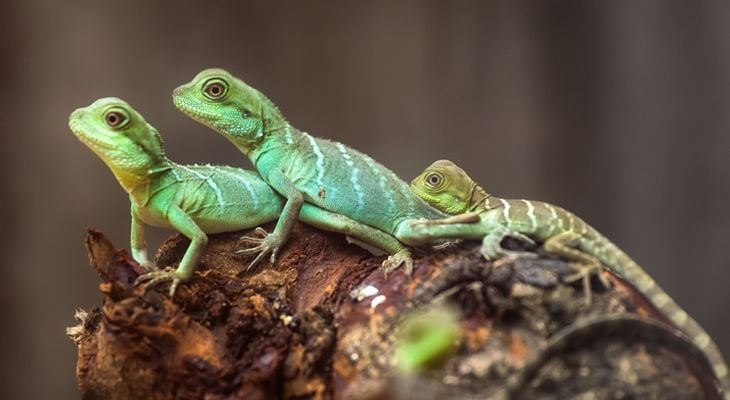
People with limited living quarters may find that reptiles such as lizards or turtles fit perfectly into their lifestyles. Before deciding on a reptile, learn as much as possible about them and their needs. Poisonous snakes and certain reptiles should never be kept as pets. Ask your veterinarian about the suitability of a particular animal before you make your decision. There are many things to consider before committing to a reptile as a pet.
Finding out if a Pet is Legal Where You Live
Many areas have enacted laws pertaining to keeping reptiles. Some are general and some are quite specific; in many places any reptiles that are considered dangerous (venomous snakes, alligators, etc.) are illegal but some places are even more restrictive (for example, in some states all constricting snakes including ball pythons are illegal).
Salmonella Risks and Prevention
All reptile owners need to be informed about Salmonella infections. While the risks shouldn't keep most people from keeping reptiles since with the proper management the risks are minimal. Still, owners should be aware of the risks, and the US Centers for Disease Control recommends that certain risk groups should be careful about contact with reptiles and amphibians.
The Importance of Light and Heat
Many problems with keeping reptiles can be traced back to not providing the proper environmental conditions, particularly heat. Proper lighting is also important for many reptiles. The equipment to provide the proper heat and light to captive reptiles is often quite expensive, but is absolutely essential to keeping pet reptiles healthy. It is important to find out exactly what conditions your reptile needs and never cut corners when it comes to meeting those conditions!
Why Choose Captive Bred Reptiles
There are numerous reasons why you should pick a captive bred reptile if at all possible, as explained here.
How to Pick a Healthy Reptile
It is important to keep in mind that depending on where you get a reptile, it may be very stressed, dehydrated, and prone to illness. Here are some items to look for when buying your reptile to increase the chances of picking out a healthy pet reptile.
While there are many types of reptiles that could be good pets, here we cover a few you could consider.
-
5 Ways to Protect Your Dog's Hearing
The acuity of your family dog's hearing far surpasses that of humans. Hearing is a critical sense to dogs, and when diminished, will increase dependency on the sense of smell. When a dog hears something, he can hear it without moving his head. Many muscles surrounding the ears help dogs get premium sound
Read more -
Captive Reptiles May Have Nutritional Deficiency
Pet owners keeping reptiles in captivity as household pets may sometimes find that their pets have a nutritional deficiency. Metabolic bone disease is "the most common nutritional deficiency affecting captive reptiles," advises veterinarian Fredrick L. Frye in Reptile Care: An Atlas of Diseases and Treatments.
Read more -
Bringing Dog Vision in Focus
Veterinary ophthalmologists are often asked, "How well do animals see?" Visual function involves a combination of many factors, including: the field of view, depth perception, acuity, perception of motion, and color differentiation. All of these functions must then be integrated by the brain to produce
Read more -
How to Clean Your Pet's Teeth
Per their dentist’s recommendation, most people brush their teeth twice a day and floss once a day. Practicing regular at-home care and routinely visiting an oral health professional can help prevent bad breath, tooth decay and gum disease. Having good oral hygiene practices is also essential for helping
Read more
